| Listing 1 - 10 of 30 | << page >> |
Sort by
|
Book
ISBN: 160833645X 9781608336456 9781626981782 1626981787 Year: 2016 Publisher: Maryknoll, New York
Abstract | Keywords | Export | Availability | Bookmark
 Loading...
Loading...Choose an application
- Reference Manager
- EndNote
- RefWorks (Direct export to RefWorks)
Cosmology --- Astronomy --- Religious aspects --- Christianity. --- Swimme, Brian. --- Deism --- Metaphysics
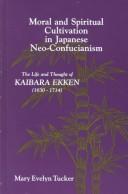
ISBN: 088706891X Year: 1989 Publisher: Albany (N.Y.) : State university of New York press,
Abstract | Keywords | Export | Availability | Bookmark
 Loading...
Loading...Choose an application
- Reference Manager
- EndNote
- RefWorks (Direct export to RefWorks)
J1008.60 --- J1440 --- J1560 --- J1650 --- Japan: Philosophy -- history -- Kinsei, Edo, Tokugawa period, early modern (1600-1867) --- Japan: Philosophy -- Confucianism --- Japan: Philosophy -- individual philosophers -- Kinsei, Edo, Tokugawa period, early modern (1600-1867) --- Japan: Philosophy -- ethics --- Kaibara, Ekiken, --- Kaibara, Atsunobu --- Ekiken, Kaibara, --- Kaibara, Ekken --- Sonken --- Kaibara, Sukesaburō --- Kaibara, Kyūbē --- Kaibara, Shisei --- 貝原盆軒 --- 貝原益軒 --- 貝原篤信 --- 카이바라, 에키켄
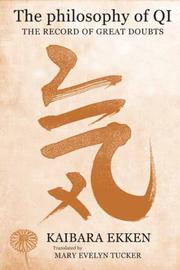
ISBN: 0231139225 9780231139229 0231511299 9780231511292 Year: 2007 Publisher: New York, NY
Abstract | Keywords | Export | Availability | Bookmark
 Loading...
Loading...Choose an application
- Reference Manager
- EndNote
- RefWorks (Direct export to RefWorks)
The Record of Great Doubts emphasizes the role of qi in achieving a life of engagement with other humans, with the larger society, and with nature as a whole. Rather than encourage transcendental escapism or quietism, Ekken articulates a philosophy of material force as a basis of living a life of commitment to the world. In this spirit, moral cultivation is not an isolated or a self-centered preoccupation, but an activity that occurs within the dynamic forces of nature and amid the rigorous demands of society. In this context, a vitalism of qi is an emergent force, not only providing the philosophical grounding for this vibrant interaction but also giving a basis for an investigation of the natural world that plumbs the principle within things. Ekken thus aimed to articulate a creative and dynamic milieu for moral education, political harmony, social coherence, and agricultural sustainability. The Record of Great Doubts embodies Ekken's profound commitment to Confucian ideas and practices as a method for establishing an integrative ethical vision, one he hoped would guide Japan through a new period of peace and stability. A major philosophical treatise in the Japanese Neo-Confucian tradition, The Record of Great Doubts illuminates a crucial chapter in East Asian intellectual history.
Conduct of life --- Conduct of life. --- Conduct of life -- Early works to 1800. --- Philosophy & Religion --- Philosophy --- Ethics. --- Deontology --- Ethics, Primitive --- Ethology --- Moral philosophy --- Morality --- Morals --- Philosophy, Moral --- Science, Moral --- Values
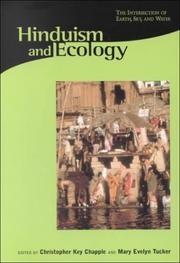
ISBN: 0945454260 0945454252 9780945454250 9780945454267 Year: 2000 Publisher: Cambridge: Harvard university press,
Abstract | Keywords | Export | Availability | Bookmark
 Loading...
Loading...Choose an application
- Reference Manager
- EndNote
- RefWorks (Direct export to RefWorks)
This fourth volume in the series exploring religions and the environment investigates the role of the multifaceted Hindu tradition in the development of greater ecological awareness in India. The twenty-two contributors ask how traditional concepts of nature in the classical texts might inspire or impede an eco-friendly attitude among modern Hindus, and they describe some grassroots approaches to environmental protection. They look to Gandhian principles of minimal consumption, self-reliance, simplicity, and sustainability. And they explore forests and sacred groves in text and tradition and review the political and religious controversies surrounding India's sacred river systems.
Ecology --- Hinduism --- Natural history --- Nature --- Religious aspects --- Hinduism. --- Doctrines. --- Balance of nature --- Biology --- Bionomics --- Ecological processes --- Ecological science --- Ecological sciences --- Environment --- Environmental biology --- Oecology --- Religious aspects&delete& --- Doctrines --- Environmental sciences --- Population biology --- Indian religions --- Human ecology. Social biology --- Ecology - Religious aspects - Hinduism. --- Nature - Religious aspects - Hinduism. --- Natural history - India. --- Hinduism - Doctrines.
Book
ISBN: 9781610912358 1610912357 9781597267076 1597267074 9781597267083 1597267082 1941821626 9781941821626 Year: 2013 Publisher: [Place of publication not identified] Island Press
Abstract | Keywords | Export | Availability | Bookmark
 Loading...
Loading...Choose an application
- Reference Manager
- EndNote
- RefWorks (Direct export to RefWorks)
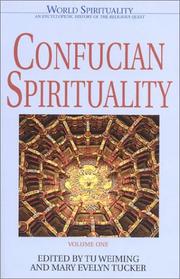
ISBN: 0824521110 Year: 2003 Publisher: New York Crossroad
Abstract | Keywords | Export | Availability | Bookmark
 Loading...
Loading...Choose an application
- Reference Manager
- EndNote
- RefWorks (Direct export to RefWorks)
Book
ISBN: 128057173X 9786613601339 030017621X 9780300176216 9780300171907 0300171900 Year: 2011 Publisher: New Haven Yale University Press
Abstract | Keywords | Export | Availability | Bookmark
 Loading...
Loading...Choose an application
- Reference Manager
- EndNote
- RefWorks (Direct export to RefWorks)
"Today we know what no previous generation knew: the history of the universe and of the unfolding of life on Earth. Through the astonishing combined achievements of natural scientists worldwide, we now have a detailed account of how galaxies and stars, planets and living organisms, human beings and human consciousness came to be. And yet . . . we thirst for answers to questions that have haunted humanity from the very beginning. What is our place in the 14-billion-year history of the universe? What roles do we play in Earth's history? How do we connect with the intricate web of life on Earth? In Journey of the Universe Brian Thomas Swimme and Mary Evelyn Tucker tell the epic story of the universe from an inspired new perspective, weaving the findings of modern science together with enduring wisdom found in the humanistic traditions of the West, China, India, and indigenous peoples. The authors explore cosmic evolution as a profoundly wondrous process based on creativity, connection, and interdependence, and they envision an unprecedented opportunity for the world's people to address the daunting ecological and social challenges of our times. Journey of the Universe transforms how we understand our origins and envision our future. Though a little book, it tells a big story one that inspires hope for a way in which Earth and its human civilizations could flourish together. This book is part of a larger project that includes a documentary film, an educational DVD series, and a website. The film and the DVD series will be released in 2011. For more information, please consult the website, journeyoftheuniverse.org"--
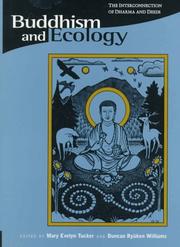
ISBN: 0945454147 0945454139 9780945454144 9780945454137 Year: 1997 Publisher: Cambridge: Harvard university press,
Abstract | Keywords | Export | Availability | Bookmark
 Loading...
Loading...Choose an application
- Reference Manager
- EndNote
- RefWorks (Direct export to RefWorks)
Buddhism is a tradition which has cultivated a profound sense of the interconnection of all life-forms in its doctrine of dependent origination. This teaching of interrelatedness may be a critical basis for the recovery of human reciprocity with nature and with all life-forms. This volume examines Buddhism's understanding of the intricate web of life. In noting the cultural diversity of Buddhism, it highlights aspects of the tradition which may be helpful in formulating an effective environmental ethics. It cites examples from both Asia and the United States of socially engaged Buddhist projects to protect the environment. Finally, the volume explores some of the theoretical and methodological issues involved in such a project. Elaborating upon topics introduced at a conference at the Harvard University Center for the Study of World Religions, the authors analyze the prospects and the problems of using Buddhism as an environmental resource in both theory and practice.
#SBIB:39A10 --- #SBIB:316.331H351 --- Antropologie: religie, riten, magie, hekserij --- Godsdienst en verstedelijking --- Ecology --- Human ecology --- Religious aspects --- Buddhism. --- Environment, Human --- Human beings --- Human environment --- Ecological engineering --- Human geography --- Nature --- Balance of nature --- Biology --- Bionomics --- Ecological processes --- Ecological science --- Ecological sciences --- Environment --- Environmental biology --- Oecology --- Environmental sciences --- Population biology --- Religious aspects&delete& --- Buddhism --- Social aspects --- Effect of environment on --- Effect of human beings on --- Human ecology - Religious aspects - Buddhism. --- Ecology - Religious aspects - Buddhism.
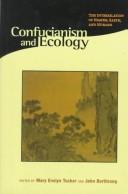
ISBN: 0945454163 0945454155 9780945454168 9780945454151 Year: 1998 Publisher: Cambridge: Harvard university press,
Abstract | Keywords | Export | Availability | Bookmark
 Loading...
Loading...Choose an application
- Reference Manager
- EndNote
- RefWorks (Direct export to RefWorks)
Confucianism demonstrates a remarkable wealth of resources for rethinking human-earth relations. This second volume in the series on religions of the world and the environment includes sixteen essays that address the ecological crisis and the question of Confucianism from three perspectives: the historical describes this East Asian tradition's views of nature, social ethics, and cosmology, which may shed light on contemporary problems; a dialogical approach links Confucianism to other philosophic and religious traditions; an examination of engaged Confucianism looks at its involvement in concrete ecological issues.
S12/0400 --- S20/0500 --- S12/0214 --- China: Philosophy and Classics--Kongzi 孔子 Confucius and Confucianism --- China: Agriculture forestry, fishery, natural disasters--Environmental policy, pollution --- China: Philosophy and Classics--Philosophy of nature --- Ecology --- Environmental ethics --- Philosophy, Confucian --- Confucian philosophy --- Confucianism --- Philosophy, Chinese --- Environmental quality --- Human ecology --- Ethics --- Balance of nature --- Biology --- Bionomics --- Ecological processes --- Ecological science --- Ecological sciences --- Environment --- Environmental biology --- Oecology --- Environmental sciences --- Population biology --- Philosophy --- Moral and ethical aspects --- Philosophy, Confucian. --- Philosophy. --- Ecology - China - Philosophy. --- Environmental ethics - China.
Book
ISBN: 1783748052 1783748044 1783748036 9791036560781 Year: 2020 Publisher: Cambridge, England : Open Book Publishers,
Abstract | Keywords | Export | Availability | Bookmark
 Loading...
Loading...Choose an application
- Reference Manager
- EndNote
- RefWorks (Direct export to RefWorks)
This book is a celebretion of the diversity of ways in which humans can relate to the world around them, and an invitation to its readers to partake in planetary coexistence. Innovative, informative, and highly accessible, this interdisciplinary anthology brings together scholars and educators across the sciences and humanities, in a collaborative effort to illuminate the different ways of being in the world and the different kinds of knowledge they entail – from the ecological knowledge of indigenous communities, to the scientific knowledge of a biologist, and the embodied knowledge communicated through storytelling. This anthology examines the interplay between Nature and Culture in the setting of our current age of ecological crisis, stressing the importance of addressing these ecological crises occurring around the planet through multiple perspectives. These perspectives are exemplified through diverse case studies – from the political and ethical implications of thinking with forests, to the capacity of storytelling to motivate action, to the worldview of the Indigenous Okanogan community in British Columbia. Living Earth Community is essential reading not only for researchers and students, but for anyone interested in the ways humans interact with the community of life on Earth, especially during this current period of environmental emergency. As with all Open Book publications, this entire book is available to read for free on the publisher’s website. Printed and digital editions, together with supplementary digital material, can also be found at www.openbookpublishers.com
Human ecology. --- Ecology --- Environment, Human --- Human beings --- Human environment --- Ecological engineering --- Human geography --- Nature --- Social aspects --- Effect of environment on --- Effect of human beings on
| Listing 1 - 10 of 30 | << page >> |
Sort by
|

 Search
Search Feedback
Feedback About UniCat
About UniCat  Help
Help News
News